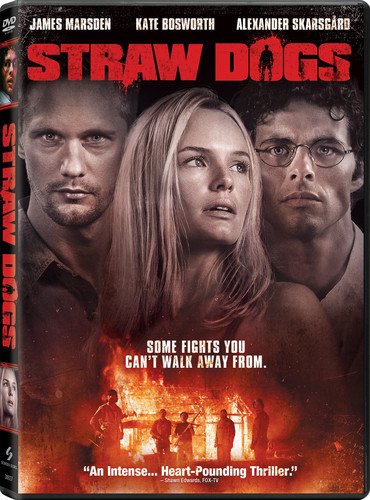
Generally, when the modern-day monarchs of Hollywood decide to remake a classic motion picture, they opt to “re-envision” it instead of simply redoing something that somebody had already done before. They change the names of the characters, set their re-imagined stories in different locations, and usually add an altogether new tale all around. It’s kind of like a witness protection program, really. In the case of Straw Dogs, the 2011 remake of Sam Peckinpah’s unforgettable, groundbreaking tale from forty years before, screenwriter/director Rod Lurie decided to dispense with the “adding any originality” procedure into his feature — giving us a near scene-for-scene restructure instead.
The result is very similar to what would happen if the FBI didn’t succeed in properly protecting a witness: the innocent party — which, in this case, would be the spirit of the original film — is humiliated in front of all, shortly before being assassinated. Lurie (whose name will not be finding its way to my list of all-time favorite filmmakers anytime soon) makes a few minor alterations in order to keep things what I’m sure he believed to be “fresh” — updating the original English countryside location to the United States’ rural south, giving us the chance to see every southern stereotype known to man displayed in full force.
Lurie has changed the main character, David Summer (James Marsden, the X-Men trilogy), to being a screenwriter writing a script about World War II (!) as opposed to a humble mathematician (rumor has it the change was because Lurie couldn’t spell “mathematician,” and made the switch because of his own inability to write anything unique) — and the concept of a hotshot Hollywood writer being so timid that he can’t speak up for himself is unrealistic at best, as one would have no problem imagining a trumped-up Tinseltown type shouting “Do you know who I am?!” at the drop of a hat. Further salt is poured on the wound by having his wife, Amy (Kate Bosworth), be a TV star. Lurie takes things even further away from reality by completely removing all emotion from his project — leaving us with a bland reproduction of the Dustin Hoffman classic.
The violence of Peckinpah’s original may have been unheard of and quite shocking at the time, but it was at least realistic. Its perpetrator — a mild-mannered man pushed over the edge — was sadistic but still retained his humanity: he didn’t kill. This time ’round, though — with violence an all-too-common trait in movies — Lurie delivers a bloody finale wherein our average Joe hero almost gets off by dispatching the country bumpkins who try to break into his home. Whoops, did I spoil it for you? Actually, I didn’t: Rod Lurie did, so you can blame him for completely missing the message of the original Straw Dogs, as well as its literary source material, Gordon Williams’ The Siege of Trencher’s Farm.
Alexander Skarsgård and James Woods costar in this turkey, which shies its way onto home video on DVD and Blu-ray after a less-than-impressive box office via Sony Pictures Home Entertainment, with way too many special features wherein the film’s cast and crew (all of whom should know better) bragging about what a great job they thought they did here. The disc also contains a number of previews for other, more-appealing titles. Frankly, the only upside to the whole film having been made as far as I can see is that it may very well serve as a superb guide for all future filmmakers of the world someday, boasting a message of “Don’t let this happen to you.”
In short: perhaps Lurie should change his name to Lurid — as that best describes what he’s accomplished here.